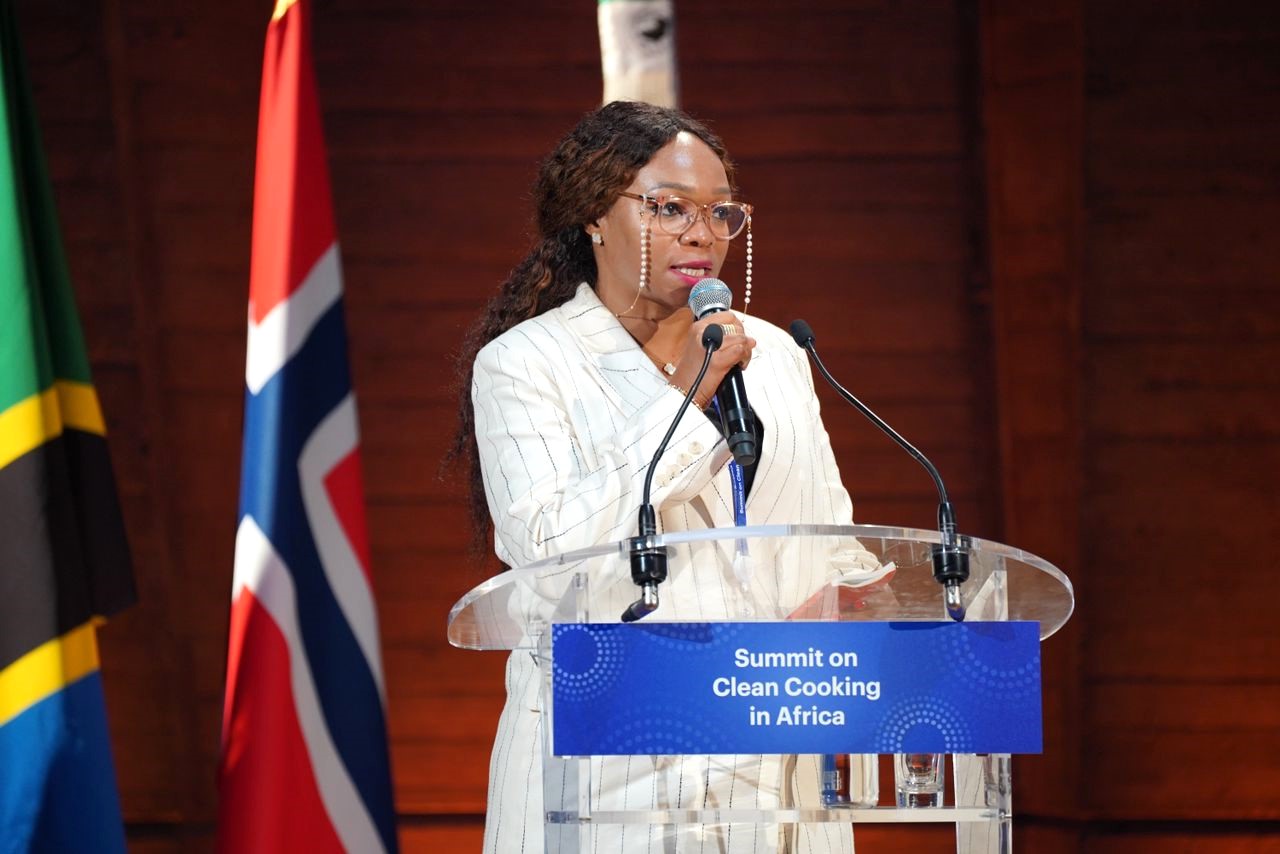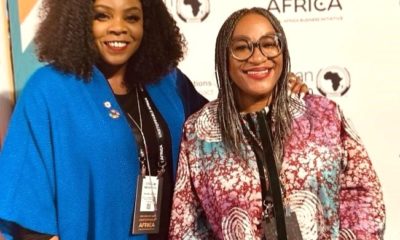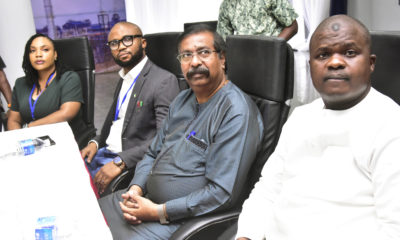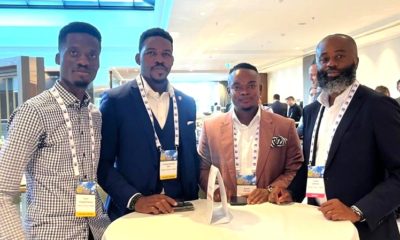Energy
Clean Cooking: Sahara Group Advocates Pan African Investment In LPG Infrastructure

Leading sustainable energy and infrastructure conglomerate, Sahara Group, has emphasized the need for infrastructure development and collaboration among all stakeholders to accelerate accessibility, affordability, and adoption of clean cooking solutions in Africa.
Head, Business Development (Gas), Sahara Group, Ijeoma Isichei expressed the view in Paris, at the Summit on Clean Cooking in Africa, organised by the International Energy Agency (IEA).
She described the dearth of adequate infrastructure for cooking gas as the most daunting challenge to ramping up clean cooking across Africa.
“I believe that opportunity lies in the greatest challenge,” she stated, advocating more investment in this regard, through industry-led expansion programs, support from developed economies, and well-established public-private-partnerships, among others.
Biztellers reports that cooking gas, also known as liquefied petroleum gas (LPG), is widely regarded as an efficient and clean-burning cooking fuel used by almost three billion people.
However, there is limited storage infrastructure to support the growing demand for LPG in Africa, making the region reliant on imports and shipping.
Isichei, who is also a senior management staff at WAGL Energy Limited (An NNPC Limited and Sahara Energy JV) said PPPs and alignment of LPG policies across the continent would further enhance access, affordability, and environmental sustainability.
She also called for more LPG advocacy platforms that would serve as a meeting point for governments, the private sector, and international organizations to give traction to global clean cooking solutions.
“I propose more public and private partnerships. A clear example would the partnership between Sahara Group and Petroci, the Côte d’Ivoire National Oil and Gas company towards the construction of 12,000MT LPG storage facilities in Côte d’Ivoire. All of this is being achieved with collaborations across the government and private sectors, with support from development agencies, WAGL and the NNPC,” she noted.
She stated that Sahara Group, through affiliations, provides access to LPG in Africa through its fleet of LPG vessels with combined capacity of 120,000cbm, whilst also working towards ramping up its LPG storage capacity to almost 100,000MT across Africa. Sahara Group’s LPG footprint also covers Asia, North and South America, she pointed out.
The CITAC estimates that by 2035 the demand for LPG in the Sub-Saharan region would almost triple, compared to current levels. According to the World Bank, regional economic blocs on the continent have set ambitious targets for LPG penetration and consumption to drive almost exclusive LPG deployment for cooking by 2030.
Isichei maintained that “To meet the growing demand, Africa would require sustainable investments in infrastructure to adequately cover import, bulk storage, transportation, filling facilities, LPG cylinders, seamless distribution, and retailing. Apart from providing a clean solution for cooking, this will help us advance towards a healthier Africa where currently, according to IEA estimates, wood and charcoal represent the primary cooking fuels of 1 billion people in Africa.”
She added that multi-stakeholder collaboration would also help improve awareness and LPG adoption as against biomass and kerosene and accelerate alignment of policies required to make LPG production, storage, transportation, and distribution seamless across Africa.
Energy
SNEPCo, Former MD Aiboni Win Energy Times’ Awards

The Shell Nigeria Exploration and Production Company (SNEPCo) has been named Major Oil Company of the Year for last year by a Nigerian publication, Energy Times.
Biztellers reports that this is in recognition of the company’s contributions to deep-water oil and gas development and the industry generally.
Energy Times also awarded the title of Amazon of Nigeria’s Oil Sector for 2024 to Elohor Aiboni, a former Managing Director of SNEPCo now on international assignment in Brunei.
The awards were presented to SNEPCo’s Senior Operations Manager, Bolanle Odunayo-Ojo, who represented the Managing Director, Ronald Adams at a ceremony attended by key stakeholders in the oil and gas sector.
ALSO READ: BREAKING: Again, Dangote Cuts Petrol Price To N835 per Litre
“We are honored to receive the recognitions for the company and our former Managing Director as they underscore our dedication to excellence in the upstream sector,” Bolanle stated. “The modest achievements are result from teamwork and support by our partners, particularly the Nigerian National Petroleum Company Limited and regulatory agencies. The awards encourage us to continue to work together to power progress and innovation in Nigeria’s energy landscape.”
The SNEPCo has been a pioneer in Nigeria’s deep-water oil and gas production since it began production from Bonga in 2005, Nigeria’s first deep-water well. Gas from Bonga is also piped to Nigeria Liquefied Natural Gas Company Limited at Bonny Island. SNEPCo’s operations have led to significant discoveries, including Bonga Southwest in 2001 and Bonga Northwest, which began production on August 5, 2014.
In its award, the Board of Directors of Energy Times pointed to the continuing success of Bonga, notably production of the 1 billionth barrel of oil in February 2023 and the recent Final Investment Decision on the $5 billion Bonga North project.
The award on Aiboni’s highlights a career that has seen her serve in various business and leadership roles within and outside Nigeria. She was appointed Managing Director of SNEPCo in 2021 and led initiatives that deepened operational efficiency, local content development and social investment projects across the six geopolitical zones in the country.
Energy
Shell Commends Oloibiri Lecture Series As Platform For Change

Shell Nigeria Exploration and Production Company Ltd (SNEPCo,) one of the sponsors of the Oloibiri Lecture Series and Energy Forum (OLEF) has commended it as a platform for driving change in Nigeria’s energy sector through the discussions that centre on business performance, cost discipline and process simplification.
“This event is special to the Shell brand, not only because of the nostalgia of Oloibiri but the quality of discourse it has enabled in our sector over the years,” SNEPCO Managing Director Ronald Adams said in a goodwill speech delivered by General Manager, Wells and Geosciences Operations Joe Mordi. He said: “We are grateful to the Society of Petroleum Engineers and our host the Petroleum Technology Development Fund (PTDF) for another successful outing.”
Organised by the Society of Petroleum Engineers (SPE) Nigeria Council, the Oloibiri Lecture Series and Energy Forum began in 1991, in commemoration of the country’s first commercial oil discovery by Shell at Oloibiri, Bayelsa State, in 1956. Ronald said recent developments in the Upstream and Downstream sectors of the energy industry, including the $5-billion final investment decision by Shell in the Bonga North Deepwater project echoed the sentiments around the first oil discovery.
ALSO READ: No Safety Guarantee For Unscheduled Visitors To Benue – Gov Alia
He noted that, “These strides come with a commitment to excellence required of us – for stakeholders, colleagues, our country and indeed, future generations. The theme for this year ‘Driving energy sustainability through technology, policy and supply chain excellence’ reflects this commitment. The future is bright, and we have the opportunity to co-create it.”
Energy
NLNG Improves Nigeria’s Domestic LPG Supply Efficiency

In line with its continuous improvement culture, the Nigeria LNG Limited (NLNG) will be working closely with its stakeholders to improve operational efficiency in its domestic Liquefied Petroleum Gas (DLPG) supply in Nigeria.
According to a statement from its General Manager, External Relations and Sustainable Development, Sophia Horsfall, this was highlighted at an engagement session with stakeholders in Lagos.
It was gathered that the NLNG plans to enhance engagement and improve operational efficiency of its LPG supply through digitalisation of some of its processes which include a new platform designed to streamline regulatory processes, optimise risk management, and enhance the buyer experience. The platform will feature IT-supported relationship management, automated issue resolution, centralised real-time payments, and improved case management systems, ensuring a seamless supply process despite market shifts and external pressures.
ALSO READ: Ifon-Ilobu Crisis: Adeleke Assures Of Quick Restoration Of Peace
Manager, Commercial Contract Management, NLNG, Tolulope Longe, reiterated that the planned improvements will enable and consolidate NLNG’s resolve to delivering 100% of its LPG supply to the Nigerian market.
She said a strategic roadmap was in play to ensure the achievement of NLNG’s longstanding goals of LPG being accessible and available in the country, aligning with its vision of being a globally competitive energy company, improving lives sustainably. She also harped on the significance of these improvement initiatives and the Company’s push for LPG utilisation as a clean energy source alternative to kerosene and other fossil fuels
Longe noted that the Company remained focused on growth and sustainability of the LPG market by continuously enhancing its supply processes in collaboration with offtakers. She stressed NLNG’s commitment to collaborating with stakeholders to maintain pricing stability and long-term market viability. While acknowledging industry concerns, she noted the importance of operational efficiency in meeting market demands.
NLNG aims to strengthen stakeholder engagement and improve market efficiency in the LPG sector through enhanced customer interactions, minimised schedule disruptions, timely confirmations and deliveries, and prioritisation of customers with demonstrable capacity. As it adapts to market realities, NLNG remains committed to driving sustainability and delivering lasting value to Nigerians.






















